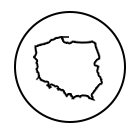Joseph and Eleanor Baran save the Kranz family
 Place
PlaceBorysław
 People
PeopleBaran Józef
Baran Eleonora
Kranz Zygmunt
Józef and Eleonora Baran lived together with their 12 years old daughter and 7 months old son in Borysławie, on the street Bukowinka (district Horodyszcze).
They lived in a flat to which belonged two rooms and kitchen. „My Husband worked as a driller in the oil industry and I did not work, I took care of the house and children,” said Eleonora. In the factory that Józef worked in, he met Zygmunt Kranz – a Jew who came to work straight from the city’s ghetto. „From a conversation with him I learned that the ghetto is also a home for his wife and son. At this time Germans were already preparing transport cars for the removal of the Jews”.
Kranz family did not know each other before but in autumn of 1941 the man offered Zygmund to move into his family house, for the time when Jews were relocated.
To the Baran family came first Franicszka (about 26 years old) and Henryk (about 3 years old) and after few days they were joined by Zygmunt (32 years old).
„The family of the Jews at the begging stayed in one of the rooms. It lasted for a few months, and after that it became too dangerous because our son, who started to talk, saw the Jewish boy, and we were afraid that he would begin to talk about him to the neighbors.” When time was passing the family decided to prepare safer shelter for them. Józef and Zygmunt dug out and prepared in the basement a room, which was lined with planks and was ventilated. There, Eleonora was bringing food for the family. „We never made any difference, they ate the same things as our family. They were coming out from this room only late in the evening to walk around and get some more air and to wash themselves in the house”. That’s how Kranz family survived until the liberation in August 1944.
The history of the assistance that Józef and Eleonora Baran provided to the family have a happy ending but to save three Jews during the German occupation was not a simple task. Only Józef was working and his salary was not enough. „Therefore, it was necessary to feed themselves. My husband with this purpose went to the surrounding villages, to get for us the food. To have milk for the children, we raised goats. In addition, we had a big garden, where – with hard work –we grown vegetables, to have what to eat for the whole winter. We also grown the tobacco, to later exchange it for food.”
All that have brought families very close to each other. When the Jews emigrated – first to Norway and later to Australia they never forgot about the people who saved their lives. Regularly and how much they could they supported Józef and Eleonora financially, although they never expected that in return. The help they gave them flowed from their good hearts.
Bibliography:
- FLV, Relacja Eleonory Baran z 15.12.1993 r..
DOCUMENTS:
No extra materials